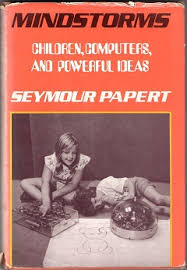Constructionisme
|
Constructionism is een term die voor het eerst werd gebruikt rond 1980 door Seymour Papert om een benadering in het onderwijs te beschrijven waarin het leren ondersteund wordt door het construeren van fysieke objecten waar, samen met anderen, betekenis aan verleend wordt.
Deze ideeën komen terug in de zogenaamde Maker Movement vanaf ongeveer 2008, en spelen ook een rol bij |

Publicatie uit 1980 |
The idea that learners construct meaning, of course, is the Constructivism of Jean Piaget. Constructivism talks about the invisible construction of ideas, and relations among ideas, within the mind of the learner. Constructionism adds to that the idea that /external/ construction of real artifacts is a powerful means to achieve Piaget’s internal construction of understanding.
If knowledge is constructed by each learner, then creativity is a constant requirement. It’s easy to underestimate the creative energy that every learner must put into the task of learning even seemingly simple matters of fact.
Plenaire sprekers
- Tim Bell (University of Canterbury, New Zealand) About CS Unplugged
- Paulo Blikstein (Stanford University, USA) Constructionism won, now what? The role of constructionist research in the age of ubiquitous computing
- James Clayson (American University of Paris, France) A computational eye: visual modelling with Python
- Paul Goldenberg (Education Development Center, USA) Teaching children to be problem posers and puzzle-creators in mathematics
- Arthur Hjorth (Northwestern University, USA) Social Gears – a Constructionist Approach to Social Studies
- Celia Hoyles (University College London, UK) The ScratchMaths project: making constructionism work in practice
- Ivan Kalaš (Comenius University, Slovakia) Primary programming in school and after school: comparisons and contrasts
- Jens Mönig (SAP, Germany) … about SNAP!
- Jenny Sendova (Institute of Mathematics, Bulgaria) Back 100 000(2)
- Wolfgang Slany (Graz University of Technology, Austria) Constructionism and smartphones: An extremely large-scale project that works sustainably all over the world
- Gary Stager (Constructing Modern Knowledge Torrance, CA, USA) Making Constructionism Great Again (1); Constructionism in Practice (2)
- Uri Wilensky (Northwestern University, Evanston, IL, USA)
Website: constructionism2018.fsf.vu.lt
- Libow Martinez, S. and Stager, G. (2014). Invent To Learn. Making, Tinkering, and Engineering in the Classroom.
- Papert, S. (1980). Mindstorms: Children, computers and powerful ideas. Brighton: Harvester Press.
- Wikipedia


